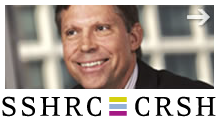SSHRC KIS/Cluster meeting: Day 2 (October 23, 2009)
 Recharged after a good nights sleep in the Albert @ Bay Hotel, the 34 knowledge brokers reassembled to continue the dialogue on KM, research and the services to support them both. One message we heard repeatedly on Day 1 was the need for institutional infrastructure to support KM and Day 2 added the need for infrastructure to support networking amongst an emerging KM community of practice.
Recharged after a good nights sleep in the Albert @ Bay Hotel, the 34 knowledge brokers reassembled to continue the dialogue on KM, research and the services to support them both. One message we heard repeatedly on Day 1 was the need for institutional infrastructure to support KM and Day 2 added the need for infrastructure to support networking amongst an emerging KM community of practice.
 Here are two KM Daves you may know who are here to help: David Phipps (York University) and “the younger and better looking” David Yetman (Memorial University of Newfoundland and Labrador) were repeatedly called on to comment, offer best (ok, good) KM practices, provide leadership for local and national KM and continually offer each other jovial one upmanship (enjoy the Perrier, Yetman!). York and MUN have made institutional investments in KM that, when combined with SSHRC grant funding, has allowed these two institutions to demonstrate national KM leadership such as yaffle and ResearchImpact. A number of KIS and Cluster projects wished their institution had a David. We can’t be cloned (which would be a breach of CIHR guidelines on human cloning) but we can be exemplars for other institutional knowledge brokers.
Here are two KM Daves you may know who are here to help: David Phipps (York University) and “the younger and better looking” David Yetman (Memorial University of Newfoundland and Labrador) were repeatedly called on to comment, offer best (ok, good) KM practices, provide leadership for local and national KM and continually offer each other jovial one upmanship (enjoy the Perrier, Yetman!). York and MUN have made institutional investments in KM that, when combined with SSHRC grant funding, has allowed these two institutions to demonstrate national KM leadership such as yaffle and ResearchImpact. A number of KIS and Cluster projects wished their institution had a David. We can’t be cloned (which would be a breach of CIHR guidelines on human cloning) but we can be exemplars for other institutional knowledge brokers.
 Yet here, a caution. David Yetman employs methods (such as yaffle) that could not have been developed at York. UVic runs grad courses in partnership with the BC Government that could not be replicated in Ontario. York has a portfolio approach that has allowed us to create over 150 partnerships, a track record UVic cannot replicate. KM is not a cookie cutter approach. There are basic underlying principles common to all our KM practices but the tools that work in St. John’s can inform decisions in other locations but should not be assumed to be the solution to all things KM. KM services need to respond to local opportunities and engage decision makers in contextually appropriate ways (see here). What we can learn from the Davids is reminiscent of a previous Mobilize This! blog post. By learning KM principles from the Davids and adapting them to your own local context you can create conditions where maybe knowledge can be mobilized – nothing is guaranteed.
Yet here, a caution. David Yetman employs methods (such as yaffle) that could not have been developed at York. UVic runs grad courses in partnership with the BC Government that could not be replicated in Ontario. York has a portfolio approach that has allowed us to create over 150 partnerships, a track record UVic cannot replicate. KM is not a cookie cutter approach. There are basic underlying principles common to all our KM practices but the tools that work in St. John’s can inform decisions in other locations but should not be assumed to be the solution to all things KM. KM services need to respond to local opportunities and engage decision makers in contextually appropriate ways (see here). What we can learn from the Davids is reminiscent of a previous Mobilize This! blog post. By learning KM principles from the Davids and adapting them to your own local context you can create conditions where maybe knowledge can be mobilized – nothing is guaranteed.
 A few other items of note from Day 2. Chad Gaffield spoke about the institutional and cultural barriers that need to come down to embrace a new paradigm of scholarship. He spoke of the need for institutions to invest in an institutional KM capacity for KM the way we invest in technology transfer, which, despite sustained investments has not been an innovation panacea. Kudos to SSHRC who unveiled their new program architecture – keep your dial on SSHRC for more information to come. And we spoke about other organizations who should partner in KM including CFI, Foundations and the for profit sector – it shouldn’t all be “mama SSHRC”. The Davids welcome this news.
A few other items of note from Day 2. Chad Gaffield spoke about the institutional and cultural barriers that need to come down to embrace a new paradigm of scholarship. He spoke of the need for institutions to invest in an institutional KM capacity for KM the way we invest in technology transfer, which, despite sustained investments has not been an innovation panacea. Kudos to SSHRC who unveiled their new program architecture – keep your dial on SSHRC for more information to come. And we spoke about other organizations who should partner in KM including CFI, Foundations and the for profit sector – it shouldn’t all be “mama SSHRC”. The Davids welcome this news.
There may be many Davids out there and each one is going to be and act a little different. But they’re all Davids. And that is a good thing.
[vodpod id=ExternalVideo.889976&w=425&h=350&fv=m%3D1615156%26type%3Dvideo%26a%3D0]